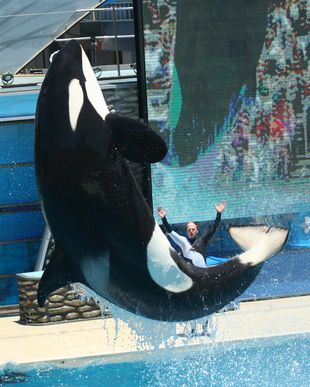Top Class Actions’s website and social media posts use affiliate links. If you make a purchase using such links, we may receive a commission, but it will not result in any additional charges to you. Please review our Affiliate Link Disclosure for more information.
SeaWorld was hit wit
Plaintiff Joyce Cole Kuhl of South Carolina filed this SeaWorld orca whale class action lawsuit in the wake of the documentary “Blackfish,” which was released in January 2013 at the Sundance Film Festival and was eventually aired in October 2013 on CNN, where it “was the most widely watched program of the year for the network.”
The film follows the life of an orca whale named Tilikum that lived at SeaWorld in Orlando since 1992 and was the cause of death of three different people.
“‘Blackfish’ reveals to those who have viewed it, among other things, which conditions of confinement at SeaWorld are unnatural and unhealthy for its orcas, and that SeaWorld has mistreated its orca population causing physical harm and mental distress to its orca population,” the SeaWorld class action lawsuit explains.
“It also reveals how orca confinement compromises orca trainer safety and orca safety, and how SeaWorld continued to feature an orca that had killed several people as a result of frustration stemming from his capture and captivity,” it adds.
There was also a book published in March 2015 by former trainer John Hargrove titled, “Beneath the Surface: Killer Whales, SeaWorld, and the Truth Beyond Blackfish,” which further discloses how orcas are allegedly mistreated at SeaWorld.
SeaWorld markets it orca whale shows as killer whales and man “living in harmony and playing together for public entertainment.” However, Kuhl contends that “this illusion masks the ugly truth about the unhealthy and despairing lives of these whales. This is a truth that, if known to the purchasing public at the time families make the decision to visit SeaWorld, buy a membership, or pay for an ‘exclusive park experience,’ would lead them to seek entertainment elsewhere.”
According to the class action lawsuit, orcas are very social animals when they live in the wild “in stable, kin-based social groups” that vary any where from two to 15 orcas, and they are able to “roam approximately one hundred (100) miles a day.”
SeaWorld deceives the public, the orca class action alleges, by concealing “the impact on these animals of captivity in a tiny confined space, the forced separation from their mothers, the unnatural mixing of whales that do not have the same culture in small spaces, the forced breeding and inbreeding of young female whales, the routine use of pharmaceutical products to unnaturally drug the orcas, the psychological manipulation and at times food deprivation to which they are subjected, the deep rake marks on their bodies that result from incompatibility and cramped conditions, and many other life-shortening and painful experiences from which they have no escape.”
Because of the way the orcas are treated, the “SeaWorld whales die many years before they would in the wild,” the class action lawsuit claims.
Kuhl says that she and “tens of thousands of consumers, would not have paid for admission to SeaWorld, for SeaWorld memberships, or for SeaWorld animal experiences for children or adult . . . if the truth about the treatment and behavior of SeaWorld’s orcas in captivity was known.”
The SeaWorld class action lawsuit is charging the amusement park with violating Florida’s Unfair and Deceptive Trade Act and unjust enrichment. She is seeking declaratory and injunctive relief.
Kuhl wants “the return of money she and others similarly situated paid to SeaWorld as a result of SeaWorld’s concealment of truth regarding the condition and treatment of its captive orcas.” She says that she paid $97.98 to get into SeaWorld Orlando in December 2013.
She is looking to represent a class of SeaWorld patrons who have attended the orca show at the SeaWorld in Orlando.
A similar orca whale class action lawsuit was filed against SeaWorld in California on March 25.
SeaWorld has issued a statement in response to Kuhl’s class action lawsuit, calling it “an attempt by animal rights extremists to use the courts to advance an anti-zoo agenda,” adding that “the suit is baseless, filled with inaccuracies, and SeaWorld intends to defend itself against these inaccurate claims.”
SeaWorld is subject to investigations by the U.S. government as well as two professional zoological associations.
Kuhl is represented by Paul S. Rothstein.
Counsel information for SeaWorld was not immediately available.
The SeaWorld Orca Whale Class Action Lawsuit is Joyce Kuhl v. Sea World LLC et al., Case No. 6:15-cv-00574, in the U.S. District Court for the Middle District of Florida.
ATTORNEY ADVERTISING
Top Class Actions is a Proud Member of the American Bar Association
LEGAL INFORMATION IS NOT LEGAL ADVICE
Top Class Actions Legal Statement
©2008 – 2024 Top Class Actions® LLC
Various Trademarks held by their respective owners
This website is not intended for viewing or usage by European Union citizens.














